THE HAPPIEST CORPSE I’VE EVER SEEN
How many reasons do you need to rush out and get tickets for the Reprise revival of Cabaret?
Let me offer a few.
First of all, this is 2011, and a better time to see Cabaret could not be imagined. That may be Berlin at the dawn of Nazism you are seeing on stage, but it could be right here, right now, as we sit here, not quite complacently, helplessly watching as our country, in the midst of economic disaster and massive unemployment, heads towards social disaster. Some of us are paying no attention, some of us are shaking our heads, some of us are wondering where we can go to escape from an unconscionable reality, should escape become necessary. And the entertainment all around us either lies to us about the immediate experience or reminds us almost daily, in intentionally absurdist ways, where we are headed.
Second, if you’ve only seen the film version, brilliant as it is, you owe it to yourself to see it as originally conceived (or in a version as close to its original conception as is possible, considering how much tinkering with the show has been done in its many revivals over the years). It could open your eyes. It might even get you to read Christopher Isherwood’s The Berlin Stories or return to the stunning I Am A Camera, in which playwright John Van Druten recreated for the theater the most powerful and cautionary and bitterly comic ideas of Herr Issyvoo (which was what his German landlady called Isherwood). All of which, I promise you, will make you re-think how closely the Berlin of 1930 resembles the times in which we are living. It’s amazing how one can describe events that actually happened and realize that it could tell us something that would be equally illuminating – in many of the same ways – sixty years later.
But the best reason of all is that Cabaret is a smashingly good, brilliantly inventive, gloriously eye-filling, unflaggingly exciting revival. It gives the audience one of those experiences that send a tingle up its spine and reminds it that the show’s the thing wherein to catch the conscience of our times. In short, it’s a hell of a show. It’s a dandy entertainment. And it’s yet another bit of palpable evidence as to why the Reprise series is one of the local treasures of Los Angeles Theater. That they assemble these shows on tight budgets and with limited rehearsal time is always remarkable. That they can come up with something this rich and this bountiful is awesome. You might even say it’s nothing short of a miracle.
Let us start with John Iacovelli’s plush but simple set, whose vivid red and gold curtains capture perfectly the sumptuously seedy Kit Kat Klub where the proceedings mostly take place; and, in sharp contrast to the cabaret atmosphere, the grim economic conditions of pre-war Germany are subtly suggested by the shabbiness of a Berlin boarding house and the ordinariness of a fruit market. All of this is framed by two George-Grozs-like caricatures that tell us something about the artistic climate of the era. Add to this Kate Bergh’s remarkably apt costumes which give the end of the flapper era a nice little farewell nod, and which depict as well the beginning of a new austerity that will eventually be undermined and outshone by those flashy Nazi uniforms. These elements are not mere decoration; they provide historical perspective.
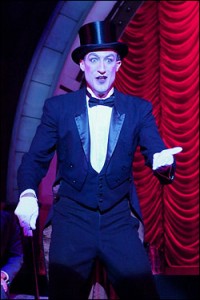 Then there is the talented and energetic ensemble that works at a breakneck level to bring the musical numbers to thrilling life (they will be even more thrilling when, the more they are performed, they fully jell). At the center of this marvelous bunch is Bryce Ryness as the Emcee; this is in no way an imitation of any of the great artists who have made this part so memorable in the past, but a bold new interpretation. His rigid authority and his piercing glances, coupled with smiling eyes that mask his true intentions, make him, sometimes at one and the same time, both loathsome and wickedly charming. His sense of style, all there in his elegant movement and in the dry use of his supple voice, heralds a potentially big star. And, despite the comic acuity with which he delivers the Emcee’s most familiar songs – “Willkommen,” “Two Ladies,” “The Money Song,” “If You Could See Her” – he is absolutely chilling in his version of “I Don’t Care Much,” a song cut from the original version and thoughtfully re-inserted this time around and which adds a dimension to the Emcee’s character it never had before.
Then there is the talented and energetic ensemble that works at a breakneck level to bring the musical numbers to thrilling life (they will be even more thrilling when, the more they are performed, they fully jell). At the center of this marvelous bunch is Bryce Ryness as the Emcee; this is in no way an imitation of any of the great artists who have made this part so memorable in the past, but a bold new interpretation. His rigid authority and his piercing glances, coupled with smiling eyes that mask his true intentions, make him, sometimes at one and the same time, both loathsome and wickedly charming. His sense of style, all there in his elegant movement and in the dry use of his supple voice, heralds a potentially big star. And, despite the comic acuity with which he delivers the Emcee’s most familiar songs – “Willkommen,” “Two Ladies,” “The Money Song,” “If You Could See Her” – he is absolutely chilling in his version of “I Don’t Care Much,” a song cut from the original version and thoughtfully re-inserted this time around and which adds a dimension to the Emcee’s character it never had before.
But, shrewdly enough, this Emcee is made a member of a strange new order rather than the leader of that movement. It may be that each generation has its own Cabaret and, in this production, it is the women who take charge. And it begins and ends with the work of its director and choreographer, Marcia Milgrom Dodge. She can be given full credit for the tough muscularity and stringent sardonicism that punctuates her vision. And yet, as seriously as she takes getting to the heart of the musical, she expertly knows how to make the most of the songs and the dances. We are having such a good time that we barely notice the dark side until the laughter curdles inside us and we fully realize that the fun, which is contagious, is at our own expense.
And Ms. Dodge puts the women in Cabaret at its center. It may come as a surprise to anyone who saw Liza Minnelli barrel her way through the part – or who are old enough and lucky enough to have seen Julie Harris play her – that Sally Bowles, as great a character as she is, was always a weak link in this musical version, and so Lisa O’Hare is a revelation in the role. From her rubber-legged Charleston in “Don’t Tell Mama” to her, at first, purposefully tenuous and, at last, sarcastically triumphant “Cabaret,” and with her crackly voice, she creates an extraordinary portrait of a woman who pushes her fears away by being wackily outrageous and determinedly blind to her surroundings, let alone to her own limitations as a performer. It is no easy task to play someone with little talent and still carry off one of the great songs in the history of musical theater. If I was so taken by her Sally Bowles, part of the reason was that I didn’t even recognize her as the same actress who played the title role in last season’s production of Gigi; when the part fits, look out for what can be done with it, and Sally Bowles fits Ms. O’Hare like a velvet glove.
But the evening belongs to Mary Gordon Murray, who has the role of Fraulein Schneider, the warm but crafty landlady of the boarding house where the central characters live when they are not drowning their sorrows at the Kit Kat. Ms. Murray reminds us that the part, originally written for the great Lotte Lenya, has some of the best songs that John Kander and Fred Ebb wrote for the show, most of which were jettisoned (as was the character, for the most part) for the film version. But “So What?” and “It Couldn’t Please Me More” and “Married” and especially the hard-edged “What Would You Do?” epitomize the arc of Cabaret as much as the Emcee’s songs do. And Ms. Murray finds the essence in each one and, with each one, stops the show dead in its tracks, locating, as she does, the coldness lurking beneath her naturally warm heart. She gets superb help, in two of the songs, from Robert Picardo as Herr Schultz, the Jewish fruit vendor she plans to marry before the Nazis give her warning that she might be making a serious mistake (in fact, one can’t help but wonder why “Meeskite” always gets cut, especially when they have as good a Schultz as Picardo is).
The able cast includes Jeff McLean as the American writer who is a stand-in for Isherwood, Katrina Lenk as a whore with a penchant for young sailors, Zach Bandler as a Nazi smuggler, and, standing out in the ensemble, Josh Walden and, as couple of voraciously hormonal homosexuals, Brett Leigh and Christopher Zenner.
Finally, if you miss this Cabaret, well – what can I say? – you’re missing one of those occasions when good old show-biz transforms itself, for a few glittering hours, into something approximating high art.
photos by Ed Krieger
Cabaret
Reprise
Freud Playhouse at UCLA
ends on September 25, 2011
for tickets, visit Reprise
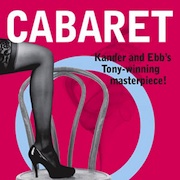
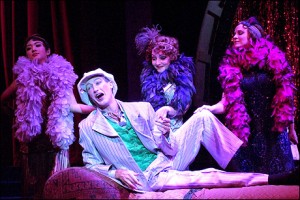
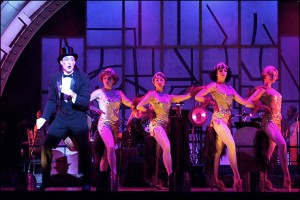
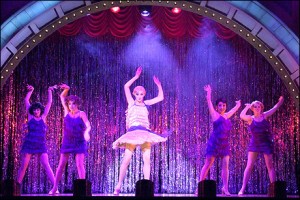
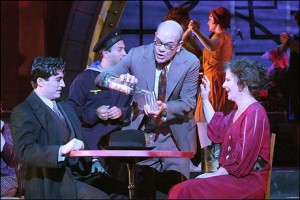
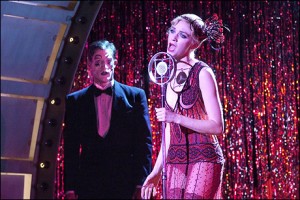
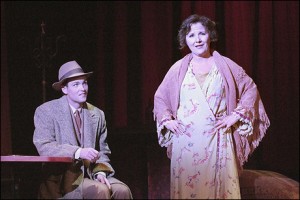
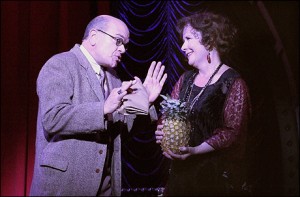
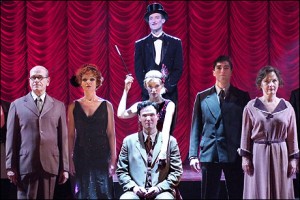
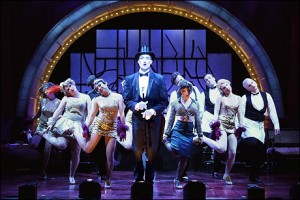
{ 2 comments… read them below or add one }
The review fits this production like a glittering glove.
This makes me feel stuck in NYC where nothing is going on anymore, in any of the arts. Back to Berlin? Thanks, Harvey!